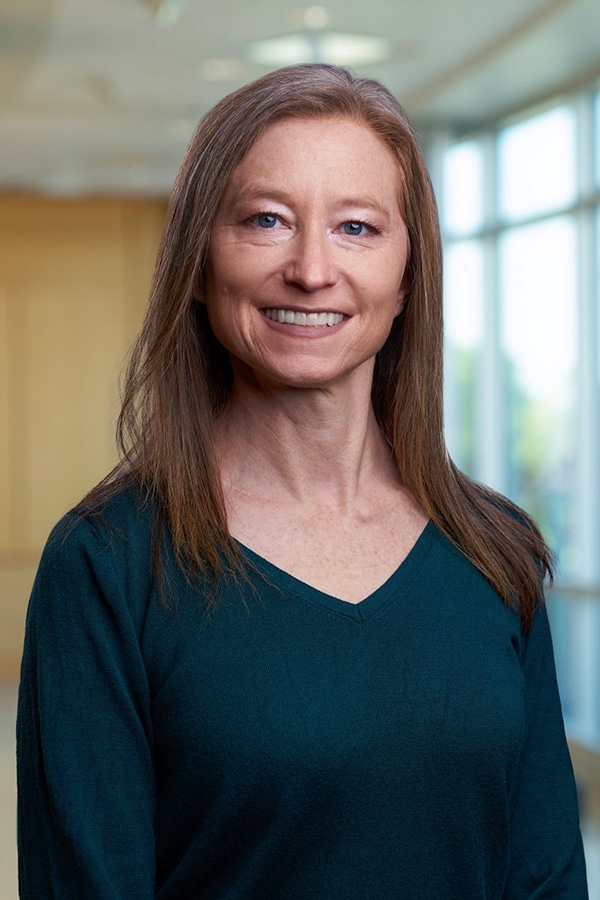
TULSA, OKLA. – Second-year University of Oklahoma pediatric resident Dr. Caroline Thompson has a professional and personal connection to cystic fibrosis patient care for children. A childhood friend had the disease and made a lasting impression on Thompson. Now, Thompson has received the Cystic Fibrosis Foundation’s Medical Resident Research Award for a pilot study evaluating pharmacogenomic-directed therapy for pediatric patients at the Oklahoma Cystic Fibrosis Center Tulsa.
Pharmacogenomics, says Thompson, is the relationship between genes and how they interact with the drugs that we take. “[Pharmacogenomics is] particularly pertinent to the CF population because they have such a complex disease process that incorporates many different organ systems and therefore many different types of medications,” she said. “And so it's really a huge aspect of their life and their treatment.”
For this study, researchers will recruit as many as 40 children with CF and have their genetics tested. Once that information comes back, the findings will be compared against databases of previously researched and established gene and drug interactions, explains Thompson. Then, the patients and their families will be provided with education on current medications as well as any possible drug interactions for future use. To conclude the study, the participants and their families will be asked to share from their perspective whether the information was helpful for current care and how they felt it would work for their child.
This type of genetic testing is a standard of care for other types of disease processes, relates Dr. Michelle Condren, OU-TU School of Community Medicine Department of Pediatrics professor, Thompson’s mentor, and pharmacist for the Oklahoma Cystic Fibrosis Center Tulsa, but genetic testing has not been traditionally used for CF care. Other studies have been done on adult and pediatric patients, but this will be the first known study on a specifically pediatric patient group.
The importance of this work for individuals with CF is paramount, relates Thompson, because “the more drugs you take, statistically the more likely you are to have either the lack of efficacy or certain side effects or interactions between drugs that may happen.” She describes how certain genes and metabolizers in each person’s body can be slightly different and cause everyone to interact with medications differently. This can affect many different systems in the body, including the gastrointestinal tract and the respiratory system, and can even affect mental health.
This award from the Cystic Fibrosis Foundation is specifically designed for residents, as it attempts to get medical professionals interested in CF research earlier in their training, says Condren. She knows first-hand the challenges of care for these special patients.

“While there are people everywhere that are trying to come up with new medications, those of us on the front lines [of CF care] are trying to figure out how to decrease side effects and how to make sure what we're doing is effective,” Condren said.
Thompson and Condren are part of a research team that includes Joseph Walter, M.D., Saint Francis Health System Warren Clinic, Samie Sabet-Sarvestani, PharmD; Amy Hendrix-Dicken, statistician; Alex Chidester, research assistant; and fellow pediatric resident, Jeffrey Frerking, M.D.
About the University of Oklahoma
Founded in 1890, the University of Oklahoma is a public research university located in Norman, Oklahoma. As the state’s flagship university, OU serves the educational, cultural, economic and health care needs of the state, region and nation. OU was named the state’s highest-ranking university in U.S. News & World Report’s most recent Best Colleges list. For more information about the university, visit ou.edu.
To combat power outages and extreme weather events, a team led by University of Oklahoma researchers has helped launch a project utilizing electric school buses as a backup energy resource.
The University of Oklahoma Health Campus was recently recognized for its increased momentum in advancing discoveries that change lives, achieving the state’s first Top 100 national ranking based on funding from the National Institutes of Health, according to the Blue Ridge Institute for Medical Research. The ranking—the highest in OU’s history and in the state—solidifies the University’s position as the state’s leading driver of health-related research.
Stefano Tarantini, an assistant professor in the Department of Neurosurgery at the University of Oklahoma College of Medicine, spends his days in the laboratory searching for answers to the cognitive decline that too often plagues older adults.